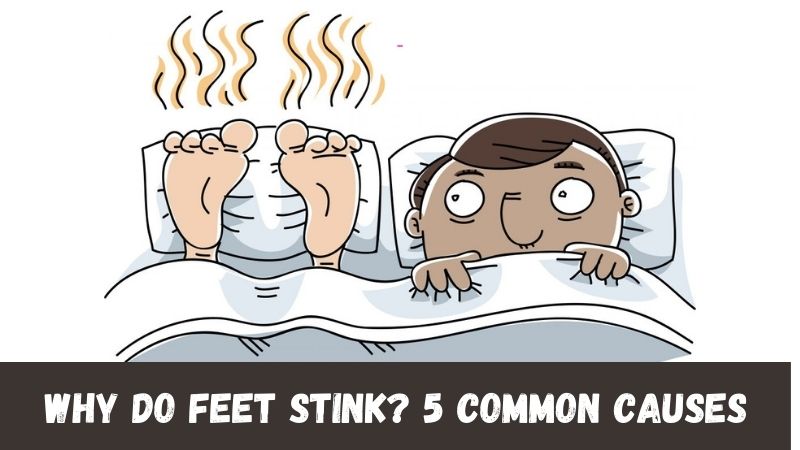
A bad smell from our feet makes us uncomfortable. And this is not only an aesthetic problem. It can be a reason to reconsider your habits or even consult a doctor.
The feet themselves do not smell. And even sweat (there are 600 sweat glands on every square centimeter of the foot) also has no smell. An unpleasant odor appears when microorganisms actively multiply in a warm, humid environment. Bacteria, in the process of their vital activity, secrete characteristic smelling fatty acids. Naturally, the more your feet sweat, the more food for bacteria and the more active the smell.
Shoes made of textile materials and imitation leather impedes air exchange, that is, does not allow the feet to breathe. If your feet stink, the shoes absorb the smell, begin to exude it and as a result, it only intensifies. Choose shoes made of genuine leather, do not wear the same pair for several days in a row, always dry your shoes and change the insoles. If possible, have spare insoles and socks with you.
They also contribute to the growth of bacteria. Try to buy cotton socks, quality tights. Change them every day.
Perhaps an unpleasant smell from your feet is a reason to see a doctor. The most common diagnosis is foot fungus, mycosis. In addition, hormonal imbalance, diabetes mellitus, hepatitis C, tuberculosis, problems of the cardiovascular and endocrine systems can be the cause of disruption of the sweat glands.
Unhealthy foods with preservatives, flavors and other unhealthy substances negatively affect the work of the sweat glands. Include in your diet more vegetables and fruits that are rich in antioxidants and vitamins. Also, an unpleasant odor can be provoked by alcoholic beverages and medications that you are taking.
The adrenaline rush increases during stressful situations or playing sports. It speeds up the work of the sweat glands and increases the unpleasant odor.
The popular medical resource HealthLine has compiled a whole program to overcome palmar hyperhidrosis.
Such advice is given by the American Academy of Dermatology. Record situations and circumstances in which your feet were sweating especially actively. This will help you identify triggers – certain foods, types of shoes, or situations – that you should avoid.
If you have hyperhidrosis, it is recommended to wash your feet at least twice a day using cool water and soap with antibacterial essential oils (tea tree, eucalyptus, and others). Dry your feet thoroughly after washing, paying special attention to the area between the toes. If moisture remains there, it will become an additional breeding ground for microbes.
Regular foot baths are also good. Pour warm water into a basin, add 3-4 tablespoons of baking soda and lower your feet there for 20 minutes. Thanks to its powerful antibacterial properties, baking soda will help reduce smelly germs on your feet.
You can also add brewed black tea to the water: it contains tannins, which tighten pores, which means that they reduce perspiration. Brew 2 tea bags, pour the tea leaves into the water, and place your feet in the basin for 10 minutes.
Regular talc and cornstarch are useful too – they absorb moisture. However, the effect lasts no more than half an hour.
It is better to use special powders sold at the pharmacy. They contain antibacterial and antifungal elements, and therefore not only keep feet dry but also fight bacteria growth.
Antiperspirants (not to be confused with deodorants!) reduce sweat. To maximize their effect, it is important to follow the rules of use.
In particular, apply them to dry feet before bed. At night, the sweat glands are less active, which means that the antiperspirant can penetrate deeper into them and reduce the amount of sweat over the next day.
The American Academy of Dermatology recommends using antiperspirants 3-4 nights in a row and then applying them once a week.
When it comes to socks, choose cotton and wool. Nylon, polyester and other synthetics do not breathe and do not wick moisture away from the skin, so it is better to refuse them.
In any case, if possible, change your socks at least a couple of times a day.
It is good if shoes are also made of breathable materials – genuine leather, suede, canvas or sports moisture-wicking synthetics. Sports models are often provided with antibacterial and odor-reducing insoles. In your case, such shoes are the very thing you need.
In addition, experts recommend not wearing the same pair for two days in a row – let the shoes dry well. And don’t forget to take good care of your shoes, trainers, or sandals.
Category: Hyperhidrosis
Tags: excessive sweating, feet, palms, sweating
© 2025 www.curesweatypalms.com. All rights reserved.